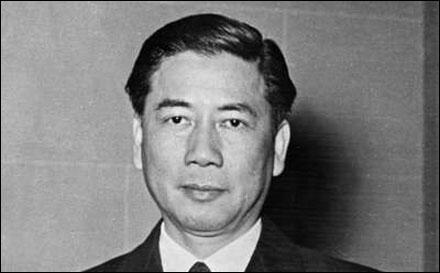On this day on 26th October
On this day in 899 Alfred the Great died. Alfred became he king of Wessex in 871. Alfred faced a serious military crisis. The kingdoms of Northumbria, East Anglia and Mercia had all recently fallen to the Vikings. Wessex under Alfred was the only surviving Anglo-Saxon province. As Barbara Yorke has pointed out: "Alfred promoted himself as the defender of all Christian Anglo-Saxons against the pagan Viking threat and began the liberation of neighbouring areas from Viking control. He thus paved the way for the future unity of England."
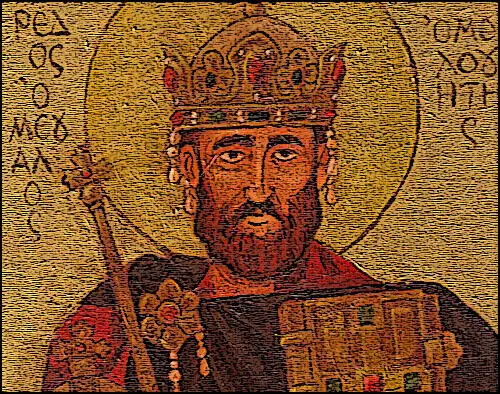
On this day in 1764 William Hogarth, English painter died. After a period painting portraits of the rich and famous, Hogarth returned in 1751 to producing prints of everyday life. Prints such as Beer Street, Gin Lane and the Four Stages of Cruelty were extremely popular and sold in large numbers. In The Election Hogarth produced four pictures that illustrated the Oxfordshire parliamentary election of 1754. Taken together, the four paintings show the evolving sequence of events during election day. The first three paintings, Election Entertainment, Canvassing for Votes and The Polling provides details of the type of corruption that took place in 18th century elections. In the final painting, Chairing the Member the winning Tory candidate's supporters celebrate his victory.
On this day in 1863 the Football Association is founded. Ebenezer Cobb Morley the founder and captain of Barnes Football Club wrote a letter to Bell's Life newspaper proposing a governing body for football. This letter resulted in a meeting taking place at the Freeman's Tavern in London on 26th October, 1863. The clubs represented at the meeting included Barnes, Blackheath, Perceval House, Kensington School, the War Office, Crystal Palace, Forest (later known as the Wanderers), the Crusaders and No Names of Kilburn. Charterhouse also sent an observer to the meeting.
The Football Association was established at this meeting. The aim of the FA was to establish a single unifying code for football. As Percy Young, has pointed out, that the FA was a group of men from the upper echelons of British society: "Men of prejudice, seeing themselves as patricians, heirs to the doctrine of leadership and so law-givers by at least semi-divine right."
Ebenezer Cobb Morley was elected as the secretary of the Football Association. At a meeting on 24th November, 1863, Morley presented a draft set of 23 rules. These were based on an amalgamation of rules played by public schools, universities and football clubs. This included provision for running with the ball in the hands if a catch had been taken "on the full" or on the first bounce. Players were allowed to "hack the front of the leg" of the opponent when they were running with the ball. Two of the proposed rules caused heated debate:
IX. A player shall be entitled to run with the ball towards his adversaries' goal if he makes a fair catch, or catches the ball on the first bound; but in case of a fair catch, if he makes his mark (to take a free kick) he shall not run.
X. If any player shall run with the ball towards his adversaries' goal, any player on the opposite side shall be at liberty to charge, hold, trip or hack him, or to wrest the ball from him, but no player shall be held and hacked at the same time.
Some members objected to these two rules as they considered them to be "uncivilised". Others believed that charging, hacking and tripping were important ingredients of the game. One supporter of hacking argued that without it "you will do away with the courage and pluck of the game, and it will be bound to bring over a lot of Frenchmen who would beat you with a week's practice." The main defender of hacking was F. W. Campbell, the representative from Blackheath, who considered this aspect of the game was vital in developing "masculine toughness". Campbell added that "hacking is the true football" and he resigned from the FA when the vote went against him (13-4). He later helped to form the rival Rugby Football Union. On 8th December, 1863, the FA published the Laws of Football.
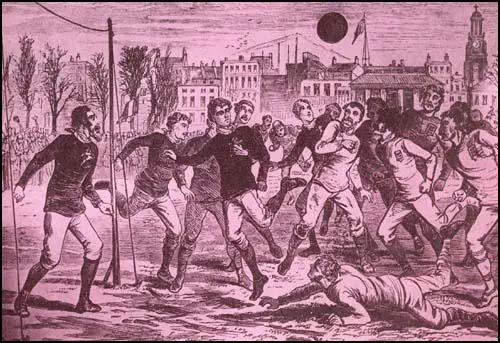
On this day in 1879 Angelina Grimke died.
Angelina Grimke, the daughter of slaveholding judge from Charleston, South Carolina, was born on 20th February, 1805. Sarah and her sister, Sarah Grimke, both developed an early dislike of slavery and after moving to Philadelphia in 1819, joined the Society of Friends.
In 1835 Angelina had a letter against slavery published by William Lloyd Garrison, in his newspaper, The Liberator. She followed this with the pamphlet, An Appeal to the Christian Women of the South. Sarah Grimke followed her example by publishing An Epistle to the Clergy of the Southern States. These pamphlets were publicly burned by officials in South Carolina and the sisters were warned that they would be arrested if they ever returned home.
The sisters moved to New York where they became the first women to lecture for the Anti-Slavery Society. This brought attacks from religious leaders who disapproved of women speaking in public. Sarah Grimke wrote bitterly that men were attempting to "drive women from almost every sphere of moral action" and called on women "to rise from that degradation and bondage to which the faculties of our minds have been prevented from expanding to their full growth and are sometimes wholly crushed." Refusing to give up their campaign, the sisters now became pioneers in the struggle for women's rights.
In 1838 Angelina Grimke married the anti-slavery campaigner,Theodore Weld. They settled in Belleville, New Jersey, with Angelina's sister, Sarah Grimke, and opened their own school. Later they established a progressive school at the Raritan Bay Community in New York.
During the Civil War Angelina wrote and lectured in support of Abraham Lincoln. After the war Angelina and Theodore Weld moved to Hyde Park, Massachusetts. Angelina Grimke continued to campaign for civil rights and woman's suffrage until her death on 26th October, 1879.
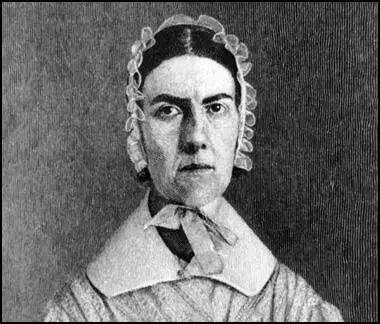
On this day in 1881 the Gunfight at the OK Corral takes place. In 1879 Wyatt Earp moved to Tombstone. Wyatt's brothers, Virgil Earp, Morgan Earp and James Earp also lived in Tombstone. Earp's best friend, Doc Holliday, was also based in this fast-growing town.
Virgil Earp eventually became city marshal of Tombstone. Soon afterwards he recruited Wyatt Earp and Morgan Earp as "special deputy policemen". In 1880 the Earp family came into conflict with two families, the Clantons and the McLaurys. Ike Clanton, Phineas Clanton, Billy Clanton, Tom McLaury and Frank McLaury sold livestock to Tombstone. Virgil Earp brothers believed that some of these animals had been stolen from farmers in Mexico. Wyatt Earp was also convinced that the Clanton brothers had stolen one of his horses.
Wyatt Earp also came into conflict with John Behan, the sheriff of Cochise County. At first this started as a quarrel over a woman, Josephine Sarah Marcus. She had lived with Behan before becoming Earp's third wife. Earp also wanted Behan's job and planned to run against him in the next election. The two men also clashed over the decision by Behan to arrest Doc Holliday on suspicion of killing a stage driver during an attempted hold-up outside of town. Holliday protested his innocence and he was eventually released. In September 1881, Virgil Earp retaliated by arresting one of Behan's deputies, Frank Stilwell, for holding up a stagecoach.
On 25th October, Ike Clanton and Tom McLaury arrived in Tombstone. Later that day Doc Holliday got into a fight with Ike Clanton in the Alhambra Saloon. Holliday wanted a gunfight with Clanton, but he declined the offer and walked off.
The following day Ike Clanton and Tom McLaury were arrested by Virgil Earp and charged with carrying firearms within the city limits. After they were disarmed and released, the two men joined Billy Clanton and Frank McLaury, who had just arrived in town. The men gathered at a place called the OK Corral in Fremont Street.
Virgil Earp now decided to disarm Billy Clanton and Frank McLaury and recruited Wyatt Earp, Morgan Earp, James Earp and Doc Holliday to help him in this dangerous task. Sheriff John Behan was in town and when he heard what was happening he raced to Fremont Street and urged Billy Clanton and Frank McLaury to hand over their guns to him. They replied: "Not unless you first disarm the Earps".
Behan now headed towards the advancing group of men. He pleaded for Virgil Earp not to get involved in a shoot-out but he was brushed aside as the four men carried on walking towards the OK Corral. Virgil Earp said: "I want your guns". Billy Clanton responded by firing at Wyatt Earp. He missed and Morgan Earp successfully fired two bullets at Billy Clanton and he fell back against a wall. Meanwhile Wyatt Earp fired at Frank McLaury. The bullet hit him in the stomach and he fell to the ground.
Ike Clanton and Tom McLaury were both unarmed and tried to run away. Clanton was successful but Doc Holliday shot McLaury in the back. Billy Clanton and Frank McLaury, although seriously wounded, continued to fire their guns and in the next couple of seconds Virgil Earp, Morgan Earp and Doc Holliday were all wounded. Wyatt Earp was unscathed and he managed to finish off Billy Clanton and Frank McLaury.
Sheriff John Behan arrested Virgil Earp, Wyatt Earp, Morgan Earp and Doc Holliday for murder of Billy Clanton, Tom McLaury and Frank McLaury. However, after a 30 day trial Judge Wells Spicer, who was related to the Earps, decided that the defendants had been justified in their actions.
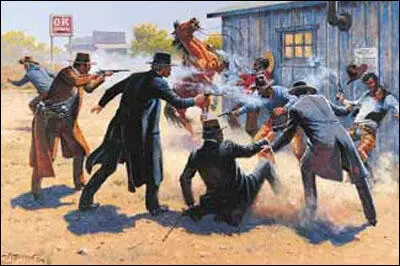
On this day in 1892 Ida B. Wells publishes Southern Horrors: Lynch Law in All Its Phases. In 1884 Ida began teaching in Memphis. She also wrote articles on civil rights for local newspapers and when she criticised the Memphis Board of Education for under-funding African American schools, she lost her job as a teacher.
Ida used her savings to become part owner of Free Speech, a small newspaper in Memphis. Over the next few years she concentrated on writing about individual cases where black people had suffered at the hands of white racists. This included an investigation into lynching and discovered during a short period 728 black men and women had been lynched by white mobs. Of these deaths, two-thirds were for small offences such as public drunkenness and shoplifting. the first conference of the NAACP she successfully persuaded the organisation to resolve to make lynching a federal crime.
On 9th March, 1892, three African American businessmen were lynched in Memphis. When Ida wrote an article condemning the lynchers, a white mob destroyed her printing press. They declared that they intended to lynch Ida but fortunately she was visiting Philadelphia at the time. Unable to return to Memphis, Ida was recruited by the progressive newspaper, New York Age . She continued her campaign against lynching and Jim Crow laws and in 1893 and 1894 made lecture tours of Britain. While there in 1894 she helped to establish the British Anti-Lynching Committee. Members included James Keir Hardie, Thomas Burt, John Clifford, Isabella Ford, Tom Mann, Joseph Pease, C. P. Scott, Ben Tillett and Mary Humphrey Ward.
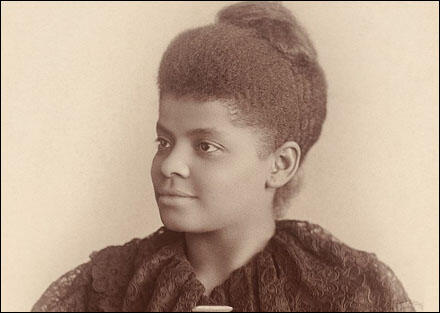
On this day in 1902 Elizabeth Cady Stanton, American suffragist died. In 1848 Stanton and Lucretia Mott organised the Women's Rights Convention at Seneca Falls. Stanton's resolution that it was "the duty of the women of this country to secure to themselves the sacred right to the elective franchise" was passed, and this became the focus of the group's campaign over the next few years.
In 1866 Stanton, Mott, Susan B. Anthony and Lucy Stone established the American Equal Rights Association. The following year, the organisation became active in Kansas where Negro suffrage and woman suffrage were to be decided by popular vote. However, both ideas were rejected at the polls.
In 1869 Stanton and Anthony formed a new organisation, the National Woman Suffrage Association (NWSA). The organisation condemned the Fourteenth and Fifteenth amendments as blatant injustices to women. The NWSA also advocated easier divorce and an end to discrimination in employment and pay.
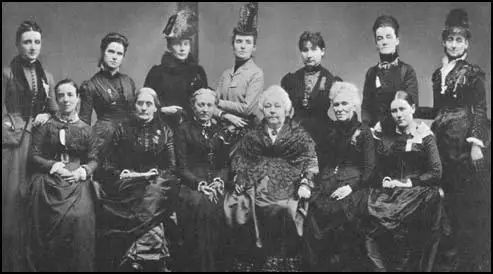
On this day in 1918 General Erich Ludendorff is dismissed by Kaiser Wilhelm II for refusing to cooperate in peace negotiations. With the Spring Offensive Ludendorff expected to breakthrough on the Western Front. When this ended in failure Ludendorff realised that Germany would lose the war. On 29th September 1918, the Third Supreme Command transferred power to Max von Baden and the Reichstag. By the end of October, Baden's government was strong enough to ask Wilhelm II to force Ludendorff from power.
After the signing of the Armistice, Ludendorff moved to Sweden where his wrote books and articles claiming that the unbeaten German Army had been "stabbed in the back" by left-wing politicians in Germany. He also published his memoirs, My War Memories, 1914-1918 (1920).
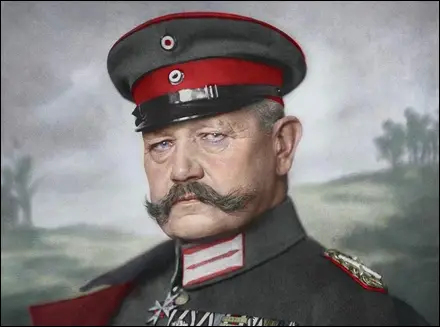
On this day in 1921 Helena Normanton married Gavin Clark but retained her maiden name. While a student Normanton married Gavin Bowman Clark (1873-1948). As Joanne Workman has pointed out: "Her application to retain her maiden name after her marriage attracted considerable public interest. Helena deplored the loss of a woman's identity on marriage and its disadvantageous legal results. While she believed in the respectability of retaining the title Mrs she also wished to maintain continuity of identity in her professional career." In 1924 she became the first married British woman to be issued a passport in her maiden name.
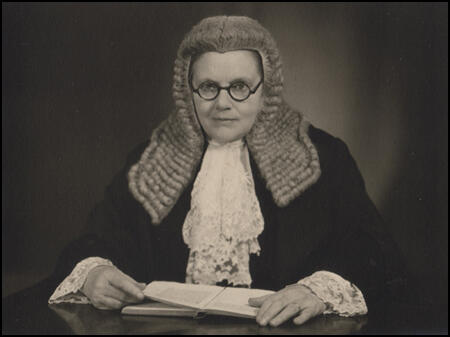
On this day in 1944 William Temple died. Along with his friend, A. D. Lindsay, he became a tutor at the Workers' Educational Association (WEA). He was later to serve as the organization's president (1908-1924). Influenced by the ideas of Henry Scott Holland Temple decided to enter the Church and he was ordained on 19th December, 1909. The following year he became headmaster of Repton School.
During the First World War Temple he became the honorary chaplain to George V. He also edited the Challenge (1915-1918) and became the leader of the Life and Liberty Movement. A socialist, Temple joined the Labour Party in 1918. In November 1920 David Lloyd George offered Temple the bishopric of Manchester. Temple became a national figure in 1926 when he urged the government to seek a negotiated agreement to the General Strike.
Temple also served as the Archbishop of York (1929-40) and the Archbishop of Canterbury (1942-44). In these posts he became an outspoken advocate of social reform and became involved in the campaign against unemployment, poverty and poor housing. George Bernard Shaw wrote: "to a man of my generation an archbishop of Temple's enlightenment was a realized impossibility".
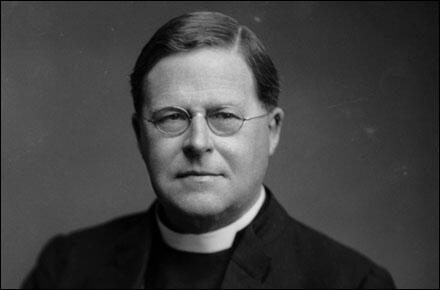
On this day in 1955 Ngo Dinh Diem proclaimed himself Premier of the newly created Republic of Vietnam. In October, 1955, the South Vietnamese people were asked to choose between Bo Dai, the former Emperor of Vietnam, and Diem for the leadership of the country. Colonel Edward Lansdale suggested that Diem should provide two ballot papers, red for Diem and green for Bao Dai. Lansdale hoped that the Vietnamese belief that red signified good luck whilst green indicated bad fortune, would help influence the result.
When the voters arrived at the polling stations they found Diem's supporters in attendance. One voter complained afterwards: "They told us to put the red ballot into envelopes and to throw the green ones into the wastebasket. A few people, faithful to Bao Dai, disobeyed. As soon as they left, the agents went after them, and roughed them up... They beat one of my relatives to pulp."
After the election Diem informed his American advisers that he had achieved 98.2 per cent of the vote. They warned him that these figures would not be believed and suggested that he published a figure of around 70 per cent. Diem refused and as the Americans predicted, the election undermined his authority.
